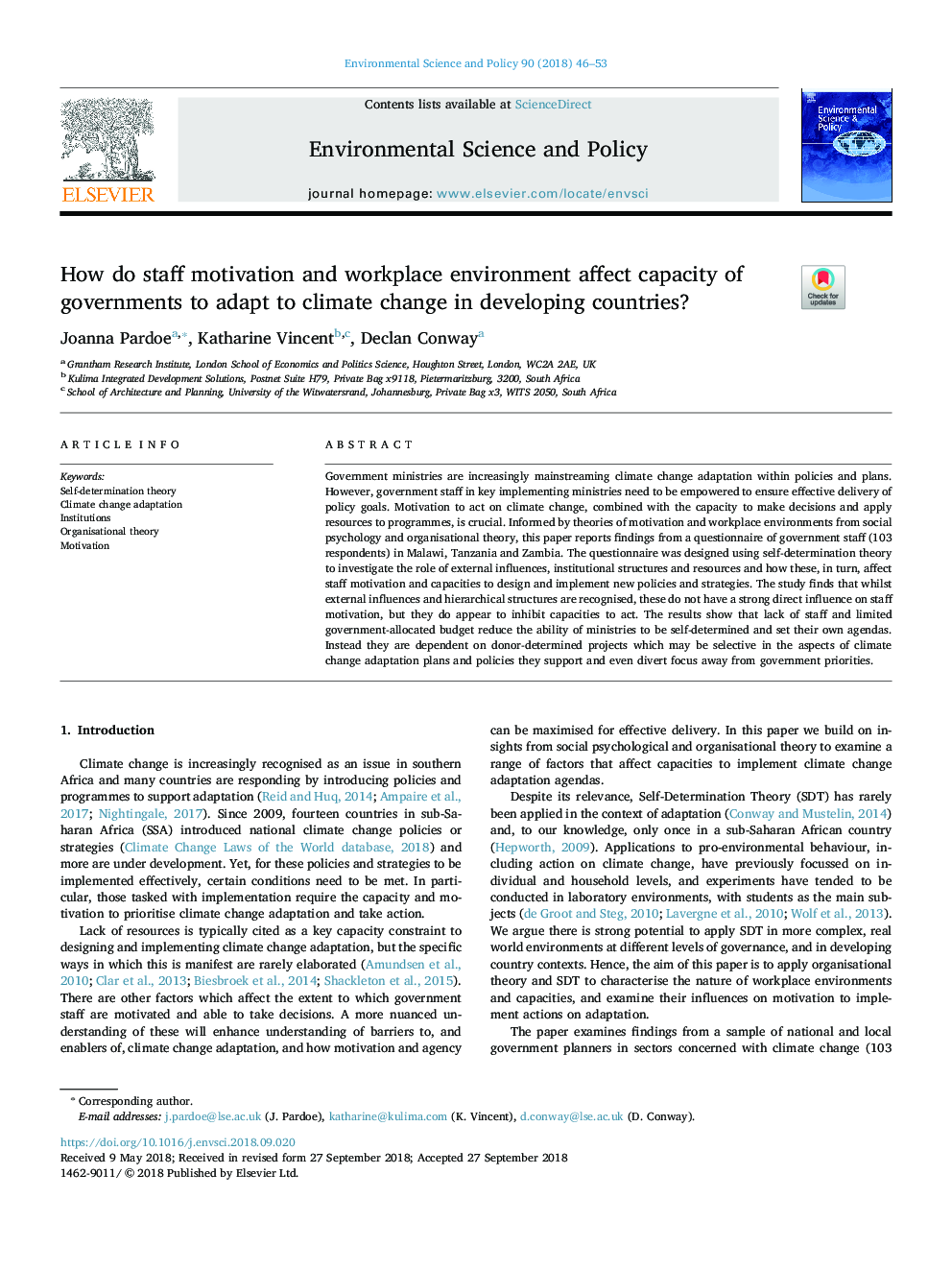| کد مقاله | کد نشریه | سال انتشار | مقاله انگلیسی | نسخه تمام متن |
|---|---|---|---|---|
| 11023256 | 1701320 | 2018 | 8 صفحه PDF | دانلود رایگان |
عنوان انگلیسی مقاله ISI
How do staff motivation and workplace environment affect capacity of governments to adapt to climate change in developing countries?
ترجمه فارسی عنوان
چگونه انگیزه کارکنان و محیط کاری کار بر ظرفیت دولت ها برای انطباق با تغییرات آب و هوایی در کشورهای در حال توسعه تاثیر می گذارد؟
دانلود مقاله + سفارش ترجمه
دانلود مقاله ISI انگلیسی
رایگان برای ایرانیان
کلمات کلیدی
نظریه خودمختاری، سازگاری تغییرات اقلیمی، موسسات، نظریه سازمان، انگیزه،
ترجمه چکیده
وزارتخانه های دولتی به طور فزاینده در حال تغییر سازگاری با تغییرات اقلیمی در سیاست ها و برنامه های خود هستند. با این حال، کارمندان دولتی در وزارتخانه های اجرایی اصلی باید توانایی لازم را برای اجرای موثر مقاصد سیاسی داشته باشند. انگیزه برای انجام تغییرات آب و هوایی، همراه با ظرفیت تصمیم گیری و اعطای منابع به برنامه ها، بسیار مهم است. این مقاله با استفاده از نظریه های انگیزش و محیط های کاری از روان شناسی اجتماعی و نظریه سازمانی، یافته های مربوط به پرسشنامه کارکنان دولت (103 نفر) در مالاوی، تانزانیا و زامبیا گزارش شده است. پرسشنامه با استفاده از نظریه تعیین خودنمایی به منظور بررسی نقش تأثیرات خارجی، ساختارهای نهادی و منابع و چگونگی تأثیر آن بر انگیزه و توانمندی کارکنان در طراحی و اجرای سیاست ها و راهبردهای نوین طراحی شد. مطالعه نشان می دهد که در حالی که تاثیرات خارجی و ساختار سلسله مراتبی به رسمیت شناخته شده است، این تاثیر مستقیم مستقیم بر انگیزه کارکنان ندارد، اما به نظر می رسد که مانع از توانایی های عمل شود. نتایج نشان می دهد که فقدان کارکنان و بودجه اختصاص یافته به دولت، توانایی وزارتخانه ها را برای خود تعیین کرده و برنامه های خود را تنظیم می کنند. در عوض، آنها وابسته به پروژه های تعیین کننده کمک کننده هستند که ممکن است در برنامه های انطباق تغییرات آب و هوایی و سیاست هایی که آنها حمایت می کنند و حتی تمرکز خود را از اولویت های دولتی دور بریزند، انتخابی باشند.
موضوعات مرتبط
مهندسی و علوم پایه
مهندسی انرژی
انرژی های تجدید پذیر، توسعه پایدار و محیط زیست
چکیده انگلیسی
Government ministries are increasingly mainstreaming climate change adaptation within policies and plans. However, government staff in key implementing ministries need to be empowered to ensure effective delivery of policy goals. Motivation to act on climate change, combined with the capacity to make decisions and apply resources to programmes, is crucial. Informed by theories of motivation and workplace environments from social psychology and organisational theory, this paper reports findings from a questionnaire of government staff (103 respondents) in Malawi, Tanzania and Zambia. The questionnaire was designed using self-determination theory to investigate the role of external influences, institutional structures and resources and how these, in turn, affect staff motivation and capacities to design and implement new policies and strategies. The study finds that whilst external influences and hierarchical structures are recognised, these do not have a strong direct influence on staff motivation, but they do appear to inhibit capacities to act. The results show that lack of staff and limited government-allocated budget reduce the ability of ministries to be self-determined and set their own agendas. Instead they are dependent on donor-determined projects which may be selective in the aspects of climate change adaptation plans and policies they support and even divert focus away from government priorities.
ناشر
Database: Elsevier - ScienceDirect (ساینس دایرکت)
Journal: Environmental Science & Policy - Volume 90, December 2018, Pages 46-53
Journal: Environmental Science & Policy - Volume 90, December 2018, Pages 46-53
نویسندگان
Joanna Pardoe, Katharine Vincent, Declan Conway,
